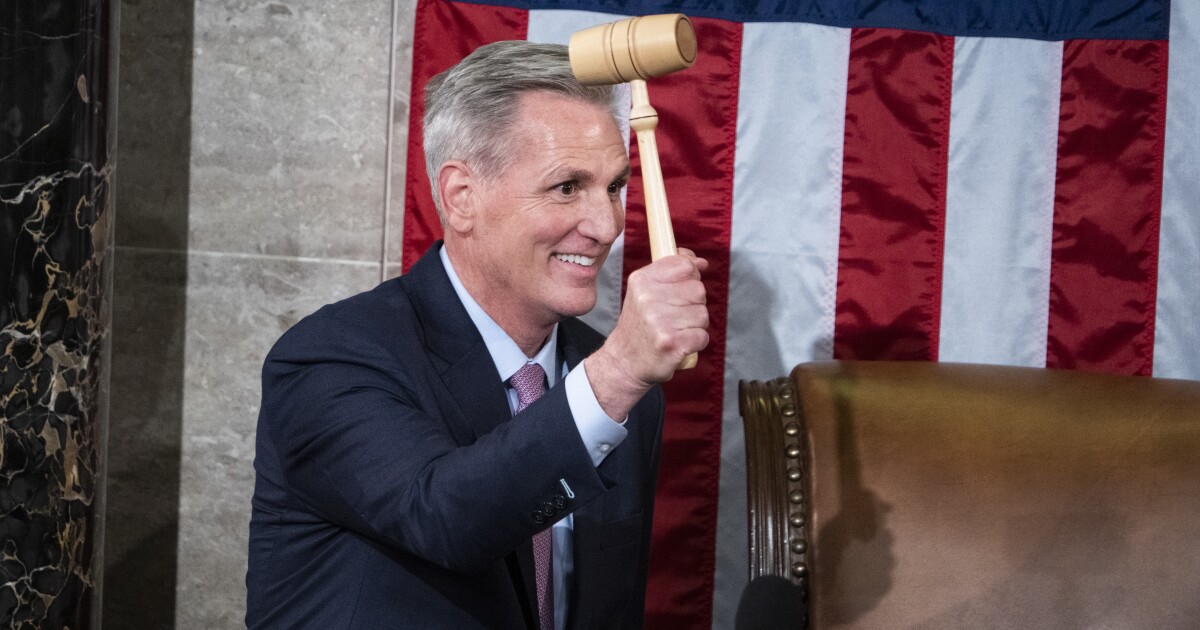

Rep. Kevin McCarthy (R-CA) finally won the speaker’s gavel following a week of painstaking negotiations in which the public watched the GOP at war with itself on the floor of the House chamber during the course of more than a dozen inconclusive votes.
Now Republicans are attempting to bury the hatchet and defending the process as an example of democracy in action. But the disarray could foreshadow how the majority navigates contentious, must-pass legislation looming in the coming months.
LAWMAKERS HEADED FOR A BIG PARTISAN STANDOFF OVER THE DEBT LIMIT IN 2023
Several lawmakers are attempting to make amends after tensions boiled over throughout the week. Rep. Dan Crenshaw (R-TX), who referred to anti-McCarthy holdouts as “terrorists” during negotiations, apologized to his colleagues on CNN on Sunday and said the back-and-forth helped build trust.
“To the extent that I have colleagues that were offended by it, I sincerely apologize to them. I don’t want them to think I actually believe they’re terrorists. It’s clearly a turn of phrase that you use in what is an intransigent negotiation,” Crenshaw said on CNN’s State of the Union.
Reps. Mike Rogers (R-AL) and Matt Gaetz (R-FL) at least publicly resolved their differences on Twitter after Rogers was seen lunging at Gaetz in a tense moment on the House floor on Friday night.
Gaetz said Rogers had his “forgiveness” and should not face “any punishment or reprisal just because he had an animated moment.” In response, Rogers retweeted the Florida congressman’s remark, saying: “I regret that I briefly lost my temper on the House Floor Friday evening and appreciate Matt’s kind understanding.”
.@RepMattGaetz and I have a long and productive working relationship, that I am sure will continue. I regret that I briefly lost my temper on the House Floor Friday evening and appreciate Matt’s kind understanding. https://t.co/8GmbJHO3cK
— Mike Rogers (@RepMikeRogersAL) January 8, 2023
Over the weekend, other Republicans defended the brinkmanship it took to elect a House speaker, with the House taking 15 rounds of votes to do so, the most since the years before the Civil War.
“Sometimes, democracy is messy, but I would argue that’s exactly how the founders intended it,” Rep. Jim Jordan (R-OH) said on Fox News Sunday.
“Whether it’s one vote or 15 votes, Kevin McCarthy is still speaker of the House,” Jordan said, comparing the extra rounds of votes before McCarthy was elected to overtime in sporting events.
Republicans who had repeatedly opposed McCarthy’s bid to become House Speaker characterized the conflict and discord as a healthy exercise for the GOP. Rep. Chip Roy (R-TX), one of the first anti-McCarthy holdouts to flip after intense negotiations, said he hoped the disagreements would help ensure Congress is less “dysfunctional” for the voters.
“A little temporary conflict is necessary in this town,” Roy said on CNN’s State of the Union. “When you saw some of the interactions there between Mike Rogers and Matt Gaetz, some of that is — we need a little of that. We need a little of this sort of breaking the glass in order to get to the table.”
The speaker’s race only aggravated existing intraparty tensions after Republicans failed to take advantage of favorable trends in 2022, including inflation and President Joe Biden’s sinking approval ratings.
The GOP largely underperformed and only managed to capture a slim majority in the House. The majority’s struggle to elect a speaker comes after Senate Minority Leader Mitch McConnell (R-KY) said he believed the outcome of the midterm elections followed Republicans giving independent voters the “impression” that the party was “involved in chaos, negativity,” and “excessive attacks.”
To become speaker, McCarthy agreed to a series of concessions that will weaken his power, one of which allows just one member to call for a “motion to vacate the chair,” which is a vote to oust him as speaker. Rep. James Comer (R-KY) said on NBC’s Meet the Press that he hopes the House speaker is given a chance to govern but predicted the motion would be used during the two-year term.
“I’m not convinced we can go an entire Congress without having it, but I believe if that is used, the overwhelming majority — when I say overwhelming majority, I mean 218-plus Republicans — recognize that Kevin McCarthy needs a chance to govern, and we are going to give him a chance,” Comer said to host Chuck Todd. “I’m not going to say there won’t be one person who tries to abuse that motion.”
While one of McCarthy’s fiercest opponents, Gaetz, said he nearly ran out of “stuff to ask for” from the future speaker during last week’s negotiations and finally helped McCarthy win the speaker’s gavel by voting “present,” the Florida congressman still appears to be unhappy with McCarthy. As of Sunday, Gaetz’s listserv was sending out McCarthy attack emails saying he was against “putting one of the biggest alligators in charge of draining the swamp.” It is unclear if the email blast was sent accidentally.
A vote on many of McCarthy’s eleventh-hour concessions, tucked into the rules package for the new Congress, was the California Republican’s first test as speaker. The House GOP adopted the package in a vote of 220-213 on Monday. After some signs of possible opposition, only one Republican voted against it.
Rep. Tony Gonzales (R-TX), a McCarthy backer, said he would vote against the package as a result of the change in rules and a cut in defense spending.
“I mean, I don’t want to see us every two months be in lockdown,” Gonzales said in an interview with Fox News on Monday morning, referring to the rule regarding the motion to vacate.
The deal McCarthy made with right-wing opponents in exchange for their support last week could put the House on a collision course for future crises, such as raising the debt limit and funding the government, creating a major challenge for Republican lawmakers who want to keep government functioning after winning the majority in the lower chamber.
The House speaker agreed to take a hard stance in budget negotiations, including effective cuts to domestic programs that Democrats, who control the Senate and White House, are sure to oppose. Centrist Republicans are already balking at the concessions McCarthy was willing to make.
The federal debt is likely to reach its statutory limit of nearly $31.4 trillion in just a matter of months. Republicans in both chambers are expected to use the nation’s debt ceiling as leverage to push policy changes, setting up a standoff that could shake global markets. Democrats and the Biden administration have said they intend to stand firm and won’t allow Republicans to pressure them to cut federal programs.
The debate is set to become one of McCarthy’s most difficult challenges. He will need to navigate working with President Joe Biden and Senate Democrats to come to an agreement without upsetting his right flank. Experts believe the Treasury could run out of borrowing funds by summer unless Congress acts. However, some of the previous “Never Kevin” Republicans take a different view: that continuing to add to the national debt is the real crisis.
“The fastest way to guarantee we have debt rating problems is to keep spending money we don’t have and keep piling on debt, and that’s what we’re doing,” said Roy on Sunday, according to Roll Call.
CLICK HERE TO READ MORE FROM THE WASHINGTON EXAMINER
Roy said he intends to hold McCarthy accountable for his promises when it comes to negotiating the debt ceiling.
“I’m not going to play the what-if games of how we’re going to use the tools of the House to make sure that we enforce the terms of the agreement,” he said. “But we will use the terms of the House to enforce the terms of the agreement.”






